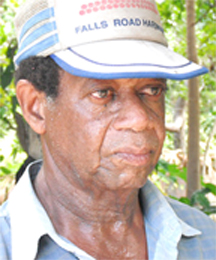SN asked citizens of Lethem to comment on issues that are affecting them in their community. Below are some of those comments:
Photos and interviews
by Carl Parker
 Jason Foo – CommunityActivist:
Jason Foo – CommunityActivist:
‘Right now we have a dengue outbreak in the region and the health authorities can do much more to alleviate our situation. For one, they can do more regular spraying in the affected communities. Presently, they are only spraying once per month, and that is totally inadequate. Now that we are in the middle of the rainy season the mosquito nuisance is increased. Next, they can embark on an aggressive education programme to highlight the effects of dengue. Many people do not know that dengue can be fatal. They feel that you get fever, headaches and diarrhoea; you go to the hospital and are given panadol. The hospital needs to educate us. The Ministry of health can also start teaching people to treat their mosquito nets. It is a cheap method and can be done in the confines of one’s home. Even if the nets have large holes, the mosquitoes will not venture near the nets.
Another issue is the absence of electricity at the Arapaima Nursery School. My wife is a member of the executive of the Parents Teachers Association, and several representations were made to the authorities for electricity to the school. The PTA was told that they will have to purchase a lantern post and wire to make that a reality. Meantime, a new building was erected next to the school and that building is getting lights. The roof and windows of the school are also leaking, and now that the rains are with us, those toddlers are facing some uncomfortable moments.
I have also noticed that government vehicles are being washed in the creeks. These waterways serve as a source of potable water for numerous residents, and ordinary people are not allowed to wash their vehicles in the creeks, so why are the government officials, inclusive of the police and RDC, doing what is forbidden?’
`I want to highlight a few issues. The first being suitable job opportunities for young, qualified people. A person must be able to get suitable employment within their communities. Right now the best secondary school in the region is seemingly training students to become salespersons; frankly, there is nothing else to do.
Meanwhile we have a lot of under-qualified persons working in the offices. That is the source of all of our troubles here in Region 9. We also need a technical school to train young people to become skilled. Most of the skilled labour is imported and the monies these people get as wages are exported, nothing remains here to develop here.
Another issue is that of littering. Lethem is fast becoming a rival to Georgetown, there is garbage everywhere. We need to address this issue urgently before it gets uncontrollable. All the relevant laws should be enforced and the authorities should be given adequate finance specifically for garbage collection and disposal.’
`I must thank SN for this opportunity because I wanted to scream at the condition of our roads, but I know no one would have heard me. The roads are miserable, and that obviously is an understatement. I noticed last year some roads were being repaired while others were being built. Less than one year after, those very roads are messy. We seem to be super experts at road building because we almost every time, build roads in the rainy season. What happen to the sunny days, we cannot do anything during that period?
I want to thank SN for highlighting our plight at the St. Ignatius Secondary School. That was timely and I do hope that the relevant authorities are going to do something about our plight. They need to provide stronger furniture. The short cut should be a thing of the past if they give us a big bus to transport us to school. Our parents benefitted from such a venture, so why should we get less? Life is a progressive thing, but this situation is definitely retrogressive.
We also need a proper sanitary block at the school and purified water to drink.
We also have a problem with our work-study programme. Only three employers are accepting students. We in the technical stream are now required to work at the hospital. That is not relevant to our field of study. Meanwhile there seems to be a lot of construction going on. It would have been nice if some of those firms could have taken on the technical students. We may have been able to offer some very good local advice on a number of issues.
Then there is the much talked about job opportunities for youths. We are screaming and once again no one is listening.’
 Lorian Toney – Region 9 Footballer
Lorian Toney – Region 9 Footballer
`The roads in Lethem are a disaster, they are simply not built properly to last any particular length of time; and when they are broken up, the same contractors are employed to rebuild. I think something is not right here. The relevant authorities should investigate the contractors’ association with the Regional Officers.
Despite the conditions of the roads, there are some road hogs that need lessons in road use and courtesy. Many times I have witnessed road users being drenched by speeding vehicles, and the drivers do not seem to care. The police should be more vigilant in this regard. Most of our accidents are caused by speeding.
As a sports person, I would like to see better facilities for sports in the Region as a whole. We have swamps and vehicle thoroughfares for sports grounds. We need sports grounds with proper facilities so that young people will have some sort of recreation and stop getting involved in activities that truly do not concern them. We need to mould young minds and bodies in a productive way. That is not the case presently.
Then we need street lights. Lethem is a dark place and people are afraid to walk at nights. It is a form of security and I cannot see why our policy makers are not finding the resources to make this possible. When you look at Bon Fim at nights, you want to move your house over there. The young people in Bon Fim have recreation parks and games facilities at nights. Probably we need to find out what they are doing and copy their model. Save the children, we need them.’
 Moti Rampersaud – Retired Public Servant
Moti Rampersaud – Retired Public Servant
`The new housing scheme at Culvert City needs some attention. I have built a house there four years now and I cannot get water and electricity. The infrastructure in general is poor and the government needs to fix it.
I am a pensioner and I am having some difficulties with my NIS pension. There is no NIS office in Lethem and we have to wait sometimes four months for an officer to visit. We used to have one some years ago but he and the Regional Executive Officer fall out so he just packed his bags and left. Since then we are without the services of a permanent officer. ‘
`We really need street lights. For too long Lethem streets are dark. There are so many dangers out there. It may even stop some of the nefarious activities that have recently become associated with Lethem and its environs.
The water distributed by Guyana Water Inc. is not used by anybody, the water is very salty. When you wash with it the soap powder don’t even lather.
Therefore we need a well that is giving wholesome water that we could use for every household purpose.
Our roads are in a bad way generally, but in front of my home there is hardly one. For years now, the road building stops a few meters from us and we are left without a proper road. In the dry season, my mother’s snackette is riddled with dust from the passing vehicles. ‘
 Abiola Xavier – CommunityActivist
Abiola Xavier – CommunityActivist
`I want to comment on the St. Ignatius School. The school is now like a cow-boy school. Teachers are more out of the school than in. When you go to the school you don’t know which teacher is responsible for which class. In my time every class had a form master or mistress. It is not so now.
Years past, children were also disciplined and well mannered. That is not so today. Some children face a bleak future because of their attitude towards societal norms.
Maybe the government should bring back corporal punishment, we benefitted from that. Maybe too, this attitude displayed is the result of the quality of teaching at schools generally. Most teachers see teaching as a job and not a profession, like the older teachers used to.
Then there is the issue of job opportunities. Most of the children passing through secondary school in Region 9 are destined for some body’s kitchen, shop or they will migrate to Boa Vista to be taken advantage of.
A significant percentage will end up in the thriving drugs business. There aren’t many prospects here despite the fact that we have some brilliant children.’
`The roads connecting the centre with Amerindian communities are in a horrible state. There is a road presently, which was only built last year that is totally washed away. There is also a big ditch in the road at Mountain Point. I don’t know how these contractors are given jobs year after year despite the poor quality of their jobs.
The roads need fixing and I hope that the government will not wait for a few more deaths to realize that the roads are bad and then decide it needs fixing. That process can take forever. Another aspect of the roads is the prevalence of what we call “scrubbing boards.” Every year after rodeo is over there are some accidents, mostly with significant loss to life or limb. Coastlanders need to be extra careful on these roads to save them some pain since the government seems to be in no hurry to build a proper road.
Another sore point is the fact that people in Georgetown sit in their comfortable offices and make decisions for us in the Rupununi, most times with telling consequences. What we need is a decentralized system where the local people who know the conditions will make certain decisions in relation to developmental issues. This will save money for the government in a number of obvious ways.
Agriculture used to be the pride of the Rupununi. Because of the same issue of centralized decision making, this is no longer the case. Hence there needs to be aggressive programmes to re-vitalize agriculture in this vast region. Food security is not to be taken lightly. Once that is done then we can develop agro-based industries and that will be the answer to some of our employment problems.’
`I want to talk about housing. I have occupied my land for 15 years and now Central Housing and Planning Authority coming to take more than half. I am 69 years of age and although I wasn’t an important person, my contribution to the development of my community is no less important than the Regional Chairman’s. I have a right to my land, but we are poor and they are bullying us. We cannot afford a lawyer. This government always boasts that they are the champion of the Amerindian cause. I want to the world to see what they are doing to an Amerindian. I am calling on all the Amerindian organisations to stand up for me now. This is my children’s future. Not because I reside out of an Amerindian community makes me any less of an Amerindian.
This issue has resulted in me losing many fruit trees, my well and my out-house. How am I and my family to exist now. We will have to go to the creek to relieve ourselves. I am not the only one to suffer this fate, but because we don’t have money they are doing this to us.’
`These people should find another place to put a road. It just don’t make any sense. Water does come right up in our backyard and the road is beyond that, so any sensible person will know that the road will be swamped for a considerable period of time in the rainy season. I started living here since I was three years old, I am now 21, and these people who came here only a few months ago are saying they know more than me, what utter arrogance. Where is decency, Where is justice? Heaven help us all. Imagine they are putting a road that a building my father started to build in 2000 will fall right in the middle of. We want people to run our affairs who are born and bred here, or have spent a considerable number of years here. They will know and understand the conditions. ‘
 Keith Cameron – Retired Public Servant
Keith Cameron – Retired Public Servant
`I just want to add to what was already published in the media about the controversial road in Tabatinga. The officers of CH&PA visited the area on Saturday last and it was evident that they are going through with the road despite our protestations and advice. It was also evident how insensitive public officials have become over the years. The old Regional Administrators are surely turning in their graves.’










